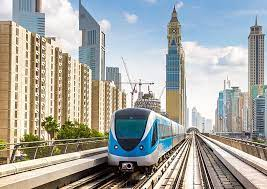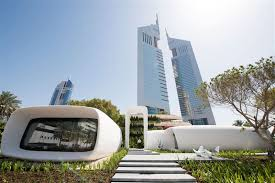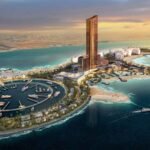Now Reading: “How Dubai’s Smart Transportation Is Changing the Way We Travel!”
-
01
“How Dubai’s Smart Transportation Is Changing the Way We Travel!”
“How Dubai’s Smart Transportation Is Changing the Way We Travel!”

Table of Contents
Dubai, known for its skyscrapers and luxury lifestyle, is now making global headlines for another reason — its cutting-edge smart transportation system. As part of the government’s grand vision to make Dubai the world’s smartest city, the transportation sector is undergoing a major digital transformation. This move is not just about self-driving cars or electric buses; it’s about building a fully connected, efficient, and sustainable travel ecosystem that makes life easier for residents and tourists alike.
What is Smart Transportation?

Smart transportation simply means using modern technologies — like Artificial Intelligence (AI), the Internet of Things (IoT), data analysis, and automation — to improve how people and goods move from place to place. These technologies help reduce traffic jams, lower pollution, save time, and improve safety on roads.
In Dubai, smart transportation includes things like self-driving taxis, AI-powered traffic lights, electric buses, drones for delivery services, and smart parking systems. These changes are making daily travel faster, cleaner, and safer.
Dubai’s Vision for Smart Transport

Dubai’s Road and Transport Authority (RTA) has set a clear goal: by 2030, 25% of all transport in Dubai will be smart and driverless. This includes cars, buses, metro systems, and even flying taxis! The plan is part of Dubai’s Smart City initiative and aims to make Dubai a leader in urban mobility.
Some major targets include:
- Self-driving taxis by 2025, run by companies like Cruise, backed by General Motors.
- An autonomous air taxi service, which could carry passengers without a pilot.
- AI-based metro and tram systems that manage schedules and energy use automatically.
- Smart traffic lights that reduce waiting times and manage rush-hour flow using real-time data.
Key Features of Dubai’s Smart Transportation
1. Self-Driving Taxis
Dubai is testing self-driving taxis to reduce traffic accidents (90% of which are caused by human errors). The driverless cars are expected to reduce carbon emissions and make transportation cheaper for everyone. These taxis will also serve elderly and disabled passengers more efficiently.
2. Electric and Hydrogen Buses
RTA introduced electric and hydrogen-powered buses to reduce carbon emissions and air pollution. These buses are monitored in real time for battery life, performance, and safety to ensure reliability.
3. Hyperloop Technology
Dubai is also exploring the Hyperloop, a super-fast transportation system that could carry passengers between Dubai and Abu Dhabi in just 12 minutes. This could change travel forever in the UAE and possibly the world.
4. Autonomous Aerial Taxis
Dubai is leading in the use of flying taxis — small drones that carry passengers across short distances. Trials of these vehicles have been successful, and they could soon reduce road traffic even further.
5. Smart Parking Systems
Finding a parking spot in Dubai can be difficult — but not for long. Smart parking solutions are being introduced where drivers can book and pay for parking via mobile apps in real time, helping them save time and fuel.
6. AI Traffic Management
New AI-based traffic light systems can change signals based on real-time traffic flow. This reduces congestion, speeds up travel, and saves energy across the city.
Benefits of Dubai’s Smart Transportation System
1. Reduced Traffic Jams
Smart traffic control and route planning will reduce the number of cars on the roads during peak hours. This means less time spent in traffic and more productive hours for residents.
2. Lower Pollution Levels
Electric vehicles (EVs), hydrogen buses, and smart metro systems will help reduce harmful emissions, making Dubai’s air cleaner and the city more environmentally friendly.
3. Improved Safety
Self-driving cars and smart buses reduce human errors — the main cause of accidents. Safety features powered by AI and sensors will protect passengers and pedestrians alike.
4. Time-Saving for Everyone
Smart transport systems mean fewer delays, easier parking, faster metro services, and on-time bus arrivals. All of this saves valuable time for residents and tourists.
5. Boost to Tourism and Economy
Tourists will find Dubai easier to explore thanks to smart taxis and AI metro services. Businesses will benefit from faster goods transport via drones and efficient delivery systems.
Challenges Dubai Faces
While Dubai is making fast progress, some challenges remain:
- High costs of installing new technologies and maintaining them.
- Public trust in driverless cars and flying taxis needs to be built.
- Ensuring cybersecurity so that systems cannot be hacked.
The government is working hard to solve these problems by partnering with global tech leaders like Tesla, Google, and Virgin Hyperloop.
The Global Impact of Dubai’s Smart Transport Model
Many countries are watching Dubai closely. If Dubai succeeds in creating a fully smart transportation network, cities like London, New York, and Tokyo may follow similar models. Dubai could become the blueprint for future cities worldwide.
Conclusion
Dubai’s Smart Transportation plan is no longer science fiction — it’s happening now. From self-driving taxis to flying drones, the city is creating the transport system of tomorrow. While challenges exist, the benefits — cleaner air, safer roads, faster travel — are worth the effort. Dubai is not just dreaming of the future; it is building it.
Read More:- Portugal’s Dama Art Gallery Takes Global Lead in Art Movement Now 2025






















